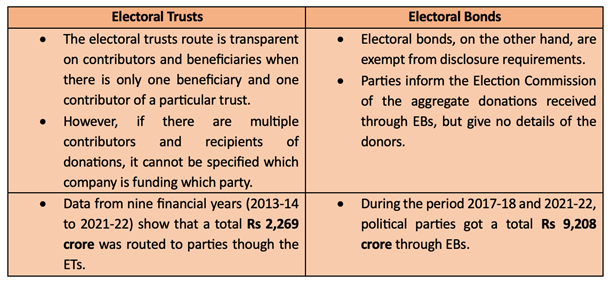Why in the News?
- After a three-day hearing, the Supreme Court has reserved its judgment on the challenge to the Central government’s Electoral Bonds Scheme.
What’s in Today’s Article?
- About Electoral Trusts (Meaning, How It Works, etc.)
- About EBs (Meaning, Purpose)
- Difference Between EBs & ETs
- News Summary
About Electoral Trusts:
- Electoral Trusts Scheme was notified in January 2013. Under the scheme, any company registered under Section 25 of the Companies Act, 1956, can form an electoral trust.
- Under Section 17CA of the Income-tax Act, 1961, any citizen of India, a company registered in India, or a firm or Hindu Undivided Family or association of persons living in India, can donate to an electoral trust.
- These electoral trusts must donate 95% of contributions received in a financial year to political parties registered under the Representation of the People Act, 1951.
- The contributors’ PAN (in case of a resident) or passport number (in case of an NRI) is required at the time of making contributions.
- The electoral trusts have to apply for renewal every three financial years.
- The number of registered trusts has ranged from three in 2013 to 17 in 2021-22, but only a few of them actually make donations every financial year.
What is an Electoral Bond?
- An electoral bond is like a financial tool used for making donations to political parties.
- The general public can also issue these bonds to fund eligible political parties.
- The bonds play a similar role as banknotes that are payable to the bearer free of interest and demand.
- An individual party can purchase these bonds digitally or with the help of a DD or cheque.
- The electoral bond scheme was launched by the Union government in 2018.
How does the EB Scheme Work?
- A citizen of India or a body incorporated in India is eligible to purchase the bond.
- EBs are issued/purchased for any value, in multiples of Rs 1,000, Rs 10,000, Rs 1,00,000, Rs 10,00,000 and Rs 1,00,00,000 from the specified branches of the State Bank of India (SBI).
- SBI is the only bank authorised to sell these bonds.
- EBs have a life of only 15 days during which it can be used for making donation only to the political parties registered under section 29A of the Representation of the Peoples Act, 1951.
- The party must have secured not less than one per cent of the votes polled in the last general election to the Lok Sabha or a State Legislative Assembly.
- The bonds shall be available for purchase for a period of 10 days each in the months of January, April, July and October as may be specified by the Central Government.
- The bond can be encashed by an eligible political party only through a designated bank account with the authorised bank.
- The political parties have to disclose the amount to the Election Commission.
Difference Between Electoral Trusts & Electoral Bonds:

News Summary:
- The Supreme Court was hearing a set of petitions challenging the Electoral Bond Scheme, on the grounds that they have opened the doors to unlimited, unchecked funding of political parties.
- The court has directed the Election Commission of India (ECI) to provide all data regarding donations to political parties received since the inception of the scheme in 2017-18 up to September 2023.
- The court reprimanded the ECI for not collecting the data despite its order in 2019 to do so.
- Central Government’s Argument:
- During the hearing, Solicitor General argued that the Electoral Bond Scheme was a fair method to ensure that money for political funding flows through proper banking channels.
- He contended that keeping the identity of donors confidential was necessary to protect them from potential retribution by political parties.
- Supreme Court’s Observation:
- CJI D Y Chandrachud suggested that the government could devise another system for political donations to address the flaws in the current electoral bond system.
- He emphasized that the goal was not to revert to a cash-only system but to create a tailored system that overcame the deficiencies of the existing scheme.
- The Supreme Court has reserved its verdict w.r.t. the validity of the Electoral Bond Scheme.









